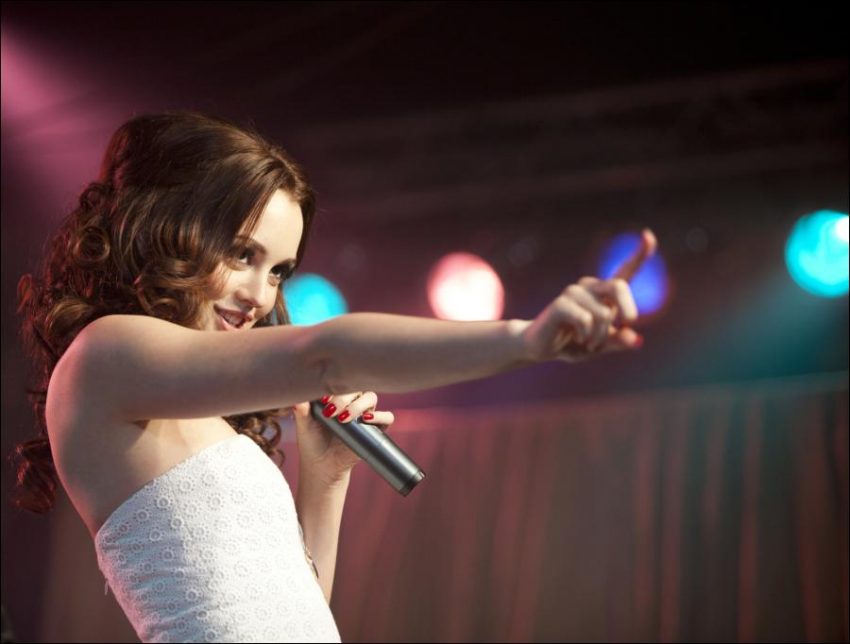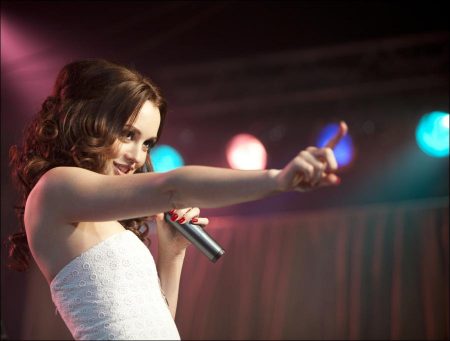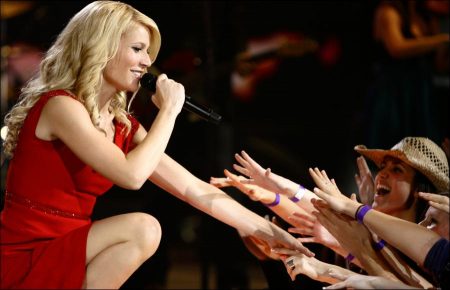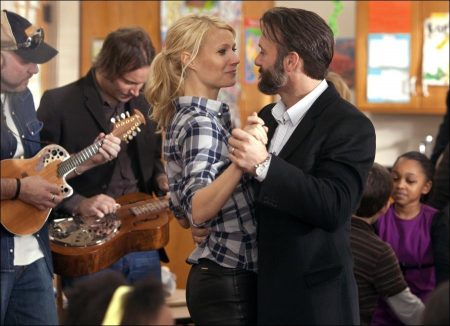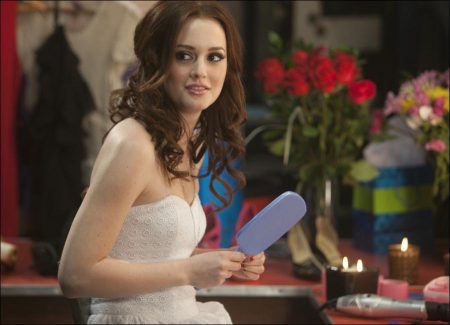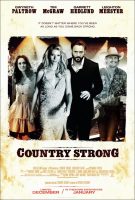Taglines: It doesn’t matter where you’ve been as long as you come back strong.
A country music superstar meets a talented young man with a guitar at the rehab facility where she is recuperating. She takes a romantic shine to him and makes sure he gets a spot on the bill when she goes on tour.
Shaken by addiction and scandal, country music superstar Kelly Canter (Gwyneth Paltrow) takes a romantic shine to Beau Hutton (Garrett Hedlund), a talented young man with a guitar who works at the rehab facility where she’s recuperating. Their relationship, however, takes a difficult turn when the handsome singer-songwriter, satisfied with performing at small clubs and honky-tonks, suddenly finds himself thrust into Kelly’s topsy turvy world as she gears up for a return to her adoring fans.
While Kelly thrives on rest (and Beau), her career-dedicated but romantically aloof husband/manager James (Tim McGraw) books a three-city comeback tour conceived as the key to his wife’s personal and professional recovery. Tensions flare when the plan calls for the tour to introduce James’ new protégée, an ambitious beauty-queen-turned-singer named Chiles Stanton (Leighton Meester).
Now deeply dependent on Beau, Kelly makes sure that her favorite newcomer gets a spot on the bill as well. As the quartet embarks on its fateful tour, romantic entanglements, dormant demons and the demands of showbiz threaten to derail all the players in this tale of modern Nashville.
When it came to setting her story of fame, love and heartbreak, writer – director Shana Feste chose the world of country music, because, she says, “I love creating drama and there’s so much drama in country music, especially within relationships. It’s very high stakes, there’s nothing small or subtle about it, so I think that out of any genre of music, country is the best one in which to set a love story. I was always really fascinated by country stars.
I love that you get these very masculine men singing about getting left alone and having their hearts broken–they become very vulnerable in their lyrics and write about things that most men don’t really talk about.” She also wanted to tell a tale of how “a romantic relationship can be hard to survive in the public eye–the success and the fame achieved by someone like Kelly Canter makes it almost impossible for any relationship to survive.”
Feste always conceived that she would direct her own screenplay. “When I write I’m usually just by myself creating this new world for me to live in,” she says. “You know when you’re reading a good book and you don’t want it to end because all of these characters have become your friends? Here I feel like I’ve created characters that I need to personally take care of, that they won’t be safe in hands other than mine. I kind of brought them into this world and I want to make sure they come to life in the right way. I also thought that this would probably be the most fun I would ever have directing, so there’s no way I would ever give it away.”
Even with only the one previous credit (the well-received but then-still unreleased The Greatest), Feste’s script was a hot commodity in Hollywood in early 2009. Producer Jenno Topping recalls how the project was entrusted to her and her producing partner Tobey Maguire. “Soon after Tobey and I had decided to partner, he gave me a stack of things to read but he didn’t tell me anything about any of them,” recalls Topping. “I got on a plane in LA and by the time I landed in New York I had read all seven scripts.
Six of them were horrible but this one made me sob. What drew me to the script was how complicated and gray the four primary characters were, that they each had compelling, sympathetic qualities and unflattering if not irredeemable characteristics. I knew that it was not an obviously commercial film because it was not ‘high concept,’ but I also knew that the parts were so well written that we could get a cast, so I called Tobey from the airport and said, ‘Let’s do it!’
Once the ball was rolling, a task of key importance was casting the film with the right actors. “There’s a fragile line between melodrama and drama,” notes Feste, “and the only thing that helps you steer clear of melodrama is working with good actors. If you have a dramatic scene read by actors without a lot of experience or who are miscast, it turns melodramatic very quickly. And I had real country stars in mind when I wrote this script, not particular actors.”
That meant Feste, Maguire and Topping needed to find actors who were both accomplished performers and dedicated learners.
The filmmakers’ first choice to play the pivotal role of Kelly Canter – a self-destructive woman of uncommon talent — was Oscar winner Gwyneth Paltrow. “I’ve known Gwyneth for a very long time,” says Topping, “and she was an obvious choice from the standpoint of her acting ability, her credibility, her stature in the film world–and the fact that she has a beautiful singing voice.
What wasn’t perfect was that she is a little younger than the character, who was meant to be at that precipice of forty-five or so when the ‘up’ part of her career might be over. But Shana, Tobey and I were so excited by the idea that it seemed ridiculous not to go to her. Gwyneth doesn’t work that much, she says no to everything and it is very difficult to get her to read a script and look at a directing sample, but it was just kismet. She read it, loved it, and asked to see Shana’s movie; she and her husband watched The Greatest and sobbed, and she called me the next day. So she was the one and only person we went to!”
Paltrow describes the process of being won over by the role. “Jenno, who has been an old, old friend of mine, sent it to me and in true form I didn’t get to it,” says Paltrow. “I’m a terrible script reader and I’ve not worked very much in the past few years in order to be home with my kids. Jenno emailed me and said ‘I’m going to kill you if you don’t read this because it’s really brilliant and it’s a great part for you.’ So I read it and she was right. I couldn’t get it out of my mind. It was very haunting and the characters were so complicated in such a good way, like everybody has a good side and a really not-so-good side. It just stayed with me. I figure if I’m going to be spending time away from my family I better be doing something that means something to me.”
Feste, who proved her mettle directing heavyweights in her first film, reveals how it had always been a dream of hers to work with Gwyneth. “You write a script in your bedroom, flat broke, and you don’t know if anybody will ever read it and suddenly, cut to a year later, you’re walking across the room to give Gwyneth Paltrow direction!” she explains. “I’m so lucky to be working with her. She has a beautiful voice and I knew that out of all the actresses out there today she’s one who would really transform, who would do her homework. She learned to play the guitar, she was in vocal lessons, she worked at this part.”
In taking on the part of a woman whose struggle against her demons can cause considerable collateral damage, Paltrow realized that Kelly Canter was one of her most demanding roles. During filming, the Oscar-winning actress confided, “I’ve not done a part that’s this challenging since before I had children because I just didn’t see how to live in both worlds and, to be totally honest, I’m struggling. It’s very hard for me to be doing this kind of part and then be coloring on the floor and making bottles. It’s really weird. It’s like the person who I’m playing is so far from who I am in my real life and it’s hard to bridge the gap.”
As Beau, the sweet-souled new rock in Kelly’s life, Garrett Hedlund found that “being with Gwyneth in this film is very much parallel to how Beau’s character is with Kelly. I’ve always had such a great respect for her as an actress, so when we’re going through these scenes where she means a great deal to Beau (who represents this kind of young potential to her), I think the situation is similar to how it is in real life. And she has such a wonderful voice. She just plays Kelly so beautifully and heartbreakingly that I don’t think they could have gotten anybody better.”
“Gwyneth’s fantastic,” agrees McGraw. “I had met her briefly years ago, but didn’t really know her — so didn’t know what to expect with the singing. And she’s just totally blown me away. Of course she’s very professional, a super nice lady, very gracious and a great actress, but her singing is just really incredible. It’s very soulful, very believeable; I could listen to a whole album of her. I think that she could compete with anybody who’s out there — there’s nothing that you don’t believe about it. Usually when actors are singing a song in a movie, the way they interpret the song with their body is a dead giveaway that they don’t know what they’re doing. The way Gwyneth handles herself on stage when she sings, it all comes across with her.”
Kelly is a powerful and wildly successful artist, but off-stage the fragile emotionality of the character is what’s most apparent, and Paltrow wanted those two sides reflected in how she looked. She notes how “Kelly isn’t the kind of fancy country lady like Dolly Parton who does full hair and makeup just to go get her hair and makeup done. When Kelly is not on, or when she’s drunk, you see her in kind of a very bare state. However, in her concert outfits, which I’ve said were like a drag queen playing Kelly Canter for Halloween because there’s so much hair and so much makeup, I’ve got like a million pounds of blonde locks. Her costumes are fun and I think that Stacey [Battat], the costume designer, struck a really good chord.”
“Kelly wears a lot of expensive clothes,” observes Battat, “but I think the thing about Kelly Canter is she’s vulnerable and she’s a bit of a mess. She has all these nice things, but doesn’t get it together the way that someone would who is spending a lot of money on their clothes. But she certainly knows when she needs to be put together, like for the press conference—when she in the public eye. But when she’s not, she’s sloppier. Some of our influences for Kelly’s elegant look were real, definitely Faith Hill, but for the most part the inspiration for Kelly came not from real artists, but more from the idea that she was vulnerable. I was thinking about how were we going to make someone as poised as Gwyneth seem like she’s falling apart.”
Battat cites two scenes as examples of how the costuming helped reflect what Kelly was going through at a particular time: “The coat that she wears when she walks outside with James at the rehab center doesn’t have clasps, so it can’t actually be buttoned. Kelly has to hold it together with her hands–there’s no other way to close it. It becomes a self-protective gesture. And that black outfit that Kelly wears in Houston, the first one we see her perform in, is a very tight little dress–a statement dress. When she comes on stage it gives her the appearance of being confident but then, as she starts to break down it becomes exposing—her body is very visible and she appears terribly vulnerable.”
During Kelly’s triumphant moments on stage in Dallas, her three dresses make bolder, successful statements. Battat describes how “the red ‘Country Strong’ dress was made after we started doing choreography and Gwyneth said she felt more comfortable dancing in boots. I thought that the costume we had originally chosen didn’t suit cowboy boots so we ended up making that red dress in Nashville with locally sourced fabrics. It’s pretty simple and, working with the movement of the choreography, provided a nice little flounce at the bottom that moved when she danced. Inspired by the choreography, I wanted her ‘Shake That Thing’ dress to be tight because that song and the movements are very sexy. For her last costume, the ‘Coming Home’ dress, we wanted her to look ethereal wearing something shiny, feathery and angelic as she enjoys her big moment.”
For the role of James, the husband-manager who doesn’t sing a note, the filmmakers chose Tim McGraw, one of country music’s most-acclaimed performers – an artist who’s sold over 40 million albums, had 30 Number One singles, and won countless awards – and a respected actor, last earning raves in the smash hit The Blind Side. “Tim is an incredible actor,” notes Feste, “and he obviously lends a lot of credibility to this film by being in this role. I knew that it would be difficult for someone from LA (even though I’m from Texas) to come in and do a movie about country music and I felt it would be important to have the support of Nashville and someone like Tim McGraw on this project.”
“Shana and I had both admired his work in Friday Night Lights,” notes Topping, “but his initial response was, ‘No, I don’t want to do anything that has to do with country music.’ Then after somebody gave him a copy of The Greatest (he and Shana are both represented by the same agency, CAA), he wanted to meet Shana.”
“He was initially very scared about attaching himself to a movie about country music,” continues Feste, “because no one wants to do a movie filled with stereotypes about the south. But that’s not what I wrote and he knew it was coming from a genuine place. Plus the character of James is very complicated; a lot of people on their first pass of the script say, ‘Oh god, James is a real bad guy,’ but I knew he wasn’t a bad guy. When I sat down with Tim he talked about how much he loved the character and identified with him — there was no judgment of the character at all. I knew he was the right person to play the role because he can play those shades of gray, he can be completely charming in one scene and totally manipulative in the next and you still love him because he’s human. “
McGraw says when he read the script, the story got to him. “It’s very heartfelt and heart wrenching and has all the ups and downs you’d expect a situation like this to have,” says McGraw. “At first I didn’t want to do it because I just didn’t think the best thing for me was to do something that had to do with country music or music in general. Then I read it a few more times and saw The Greatest: the complexity of the characters and the eye from which Shana shot that movie just changed my mind completely. But I certainly didn’t want to be in a movie where I sang, so to be the husband / manager of somebody who was going through this time in her life was just really interesting for me.
“So, all of the sudden,” McGraw continues, “I had to be involved because I just knew that she was going to bring a great deal of heart to it and she does. There’s some great music in it and Gwyneth, Garrett and Leighton are doing some great singing, but what this story really boils down to is the relationships between the four main characters and the complicated things that they go through, as real life can be with a bunch of country music singers.
James is a very straitlaced guy, he’s very internal and he’s deeply in love with Kelly. They’ve built a life together and they’ve built this career together that he hates to see fall apart so in a lot of ways it’s him standing on a cliff in the same way Kelly is. If she goes over, so does he. But I don’t think he quite gets how bad it is until it’s too late. On the surface, you could think that James might not have her best interests at heart, but I think that as things reveal themselves, you start to empathize with James and see that he really is trying to do the best thing that he can with the cards that he’s dealt.”
McGraw’s dedication to the project takes on deeper resonance when one considers that he started his “Southern Voice” tour during the Nashville-based production. The February playdates required him to fly out of Nashville on the afternoons of performances and return that night in order to be on set the following morning. “He’s probably the hardest working man I’ve ever worked with in my entire life,” praises Feste. “He was flying back and forth for shows and then coming to set for 6 a.m. calls.”
Country Strong (2010)
Directed by: Shana Feste
Starring by: Garrett Hedlund, Gwyneth Paltrow, Tim McGraw, Leighton Meester, Sean Symons, Marshall Chapman, Lari White, Jeremy Childs, Cinda McCain, Lisa Stewart, Megan Henderson, Sandra Harris
Screenplay by: Shana Feste
Production Design by: David J. Bomba, Bruce Rodgers, Fenton Williams
Cinematography by: John Bailey
Film Editing by: Carol Littleton, Conor O’Neill
Costume Design by: Stacey Battat
Set Decoration by: Ruby Guidara
Art Direction by: John R. Jensen
Music by: Michael Brook
MPAA Rating: PG-13 for thematic elements involving alcohol abuse and some sexual content.
Studio: Sony ScreenGems
Release Date: December 22, 2010
